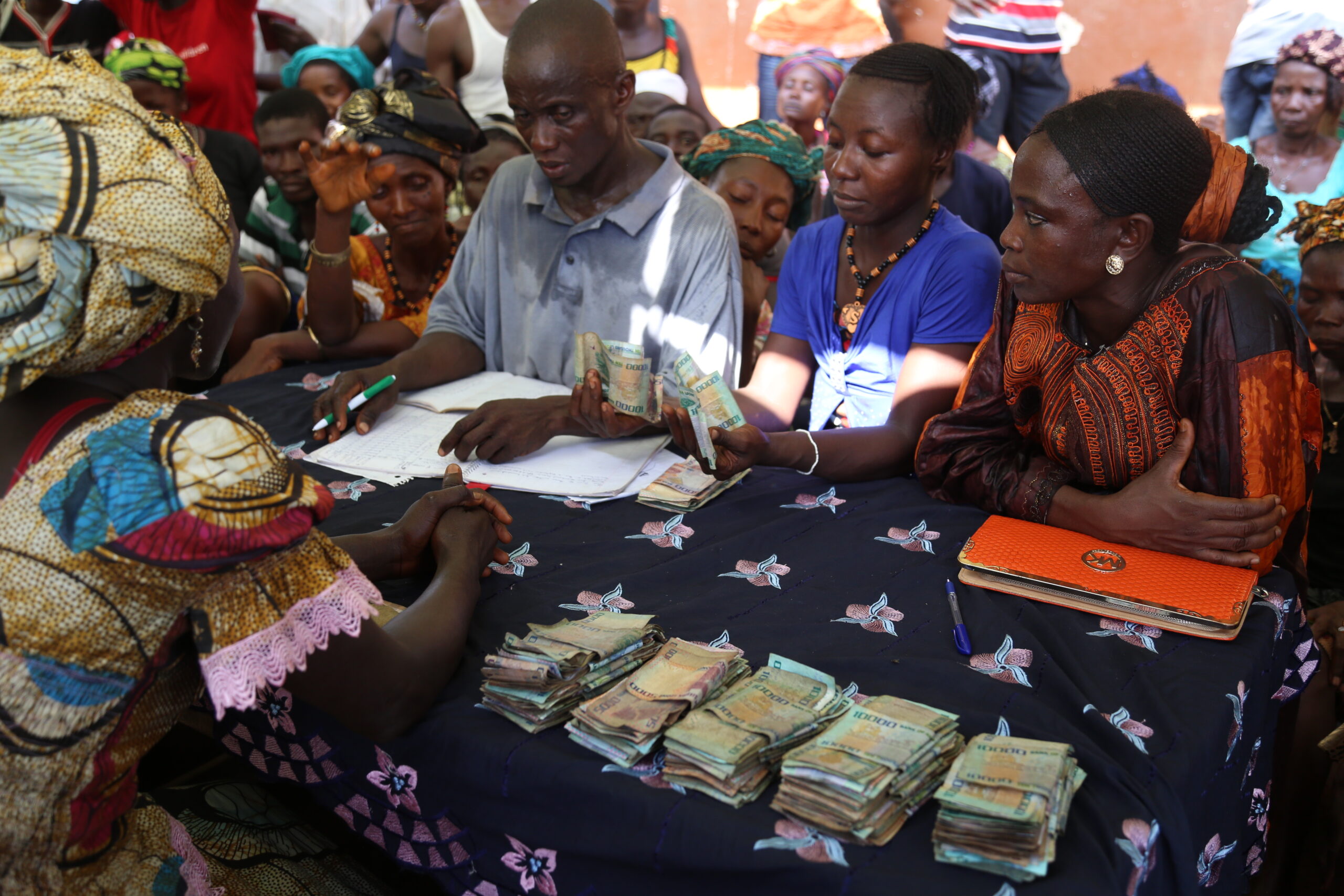A guiding question for CFP is — how can practice shift across the whole system (organizations, government, international bodies, and funders) to center communities’ leadership, priorities and capacities in peace and development? To explore this question in the international arena, last September CFP hosted, with the International Peace Institute and the Government of Sierra Leone, a side-event to the UN General Assembly. Central to that event was the exploration of Sierra Leone’s Wan Fambul (One Family) National Framework for Peace and Development, a collaborative effort to center local community leadership in a whole-system healthy partnership.

Peace Mothers in the Bomboli district, Sierra Leone, counting their earnings from their market initiative. ©Catalyst for Peace
Comments that day by CFP founder and president Libby Hoffman about how funding can best enable community-centered whole-system collaboration prompted interest in further exploration about the role of funding. To build on this interest, on May 21, Catalyst for Peace and the International Peace Institute hosted a virtual convening to explore how funders can best contribute to centering local communities’ leadership in peace and development.
This convening, which included forty participants from private foundations, government, UN agencies and national and international organizations, first heard brief presentations from Brian Flynn, Deputy Permanent Representative of the Permanent Mission of Ireland to the United Nations; Catalyst for Peace President, Libby Hoffman; Clare Lockhart, Director of the Institute for State Effectiveness; John Caulker, Executive Director of Fambul Tok International and Tehmina Akhtar, Deputy Director of Local Development Finance at the United Nations Capital Development Fund. These presentations seeded a lively conversation with questions and comments by colleagues in the virtual room. Use of the Chatham House Rule, making sure comments would not be attributed to any particular participant, contributed to the frank conversation.
The frame of the conversation was first acknowledging the essential role of local organizations and communities in peace and development and then recognizing how funders – whether bi-lateral donors or private foundations, government or international organizations – can support or impede their efforts. This frame led to the acknowledgement that overall, our funding systems, however well-intentioned, are more often hindering than supporting local ownership. Too often, they do not fund in ways that invite leadership from communities themselves, but instead discourage local leaders and create competition that harms relationships between local organizations and communities. There are notable exceptions, which will be important to learn from to catalyze new efforts to move this way of working into the mainstream. The following are some of the specific themes discussed during the event:
Community at the center of a connected system
A key problem that speakers identified is that the larger system often does not see the strengths and potential of communities or the appropriate symbiotic roles each entity in the larger system can play in supporting communities. Most action is isolated and episodic, and does not cultivate community ownership. As a positive alternative, participants were asked to consider placing communities at the center of larger system with action moving from the inside out rather than the top down or bottom up. As such, an important starting point is to cultivate an awareness of the whole system. How it is and isn’t it aligned? What would it take to create an aligned, connected system with communities at the center leading in needs and asset assessment, prioritization and planning. The success of local ownership and leadership hinges on the actions of everyone in that connected system and how they see and support the role of the community.
Coordination
Another key point that participants offered was the importance of recognizing the strengths and constraints of different parts of the funding system and how much progress could be made if funders teamed up to offer their complementary strengths. There are funders who can write large checks but have short timeframes, and funders whose checks may not be as large but who can commit to long-term engagements and deep involvement in the peacebuilding and development process. And, there are many variations in between. By recognizing constraints and strengths, there can be more coordinated and strategic efforts between funders and with INGOs and NGO’s geared towards supporting local leadership and ownership.
Good process and design
To ensure that leadership is coming from the community requires investing in inclusive processes that reach out to communities, supporting their abilities to do resource and problem assessment, prioritization and program design. Funders, international and national organizations need to reach out to those at the local level, whether community leaders or local government, and through respectful interactions, discover how best to invest in design and on-going learning spaces that allow responsiveness to challenges and shifting plans when needed.
Closing the loop
Traditional reporting lines and metrics don’t always work with inclusive, complex and responsive processes that effectively center communities. A series of written reports does not adequately communicate to everyone involved the value or success of the work. So, it’s important to create mechanisms that meet the needs of those supporting the process and help them understand how and why different approaches are effective. Among other efforts to share information and experience, and enhance mutual accountability, this may involve inviting foundation board members or policymakers to interact directly with community members in their communities so they can see what is working.
CFP and IPI left the event feeling that an on-going exploration of creative efforts to center communities in peacebuilding and development is needed. The kind of honest assessment and sharing made possible by the Chatham House Rule will be critical to dealing directly with the current reality and opening up space for ideas that lead to action grounded in reality. CFP is committed to continuing to partner in creating these learning spaces, believing they will contribute to more communities leading their own peace and development in the context of a whole-system healthy partnership.

